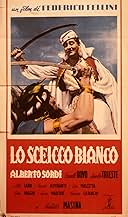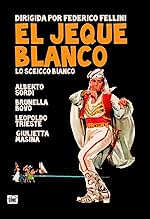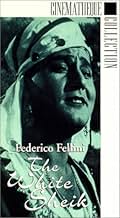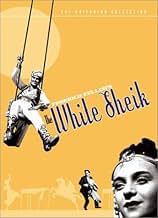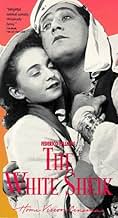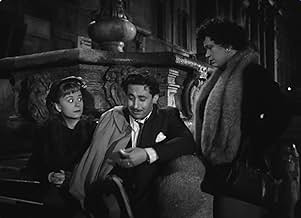AVALIAÇÃO DA IMDb
7,2/10
7,3 mil
SUA AVALIAÇÃO
Durante um dia de lua-de-mel, um casal é separado pela luxúria da cidade e pelos desejos que ela produz.Durante um dia de lua-de-mel, um casal é separado pela luxúria da cidade e pelos desejos que ela produz.Durante um dia de lua-de-mel, um casal é separado pela luxúria da cidade e pelos desejos que ela produz.
- Direção
- Roteiristas
- Artistas
- Prêmios
- 1 indicação no total
Aroldino the Comedian
- Cugino Aroldino
- (as Aroldino)
Avaliações em destaque
The protagonist is a stuffy little bureaucrat from a small town arriving for his honeymoon in Rome with his very sheltered (only a bit more than himself) young bride. He has few romantic thoughts on his mind. His main concern is a meeting with his uncle, a minor official at the Vatican, who has arranged an audience with the Pope.
While the jerk is taking a nap, his bride plots a momentary escape to fulfill her one wild fantasy---A meeting with the "White Sheik" a hero of the "frumetti"---a sort of trashy photographic comic book popular in 50s Italy---to whom she has sent red hot fan mail. She learns that the studio is only a few blocks from the hotel and resolves to meet her secret love for just a minute and get back to the hotel in time. Through a comedy of errors she is accidentally "abducted" to a shooting session where she learns to be careful about what she wishes for. Meanwhile, her husband is desperately searching for her and coming up with all kinds of frantic excuses to his family for her absence. I won't describe the movie any further for the benefit of those who wish to see it.
A very effective comedy with plenty of innuendo for adults and even some slapstick and sight gags. Loads of laughs for young and old. A very sweet story that nevertheless contains some of the surrealistic elements of Fellini's later work. If possible, get the subtitled version. The Italian language enhances the comical effect. A real gem.
While the jerk is taking a nap, his bride plots a momentary escape to fulfill her one wild fantasy---A meeting with the "White Sheik" a hero of the "frumetti"---a sort of trashy photographic comic book popular in 50s Italy---to whom she has sent red hot fan mail. She learns that the studio is only a few blocks from the hotel and resolves to meet her secret love for just a minute and get back to the hotel in time. Through a comedy of errors she is accidentally "abducted" to a shooting session where she learns to be careful about what she wishes for. Meanwhile, her husband is desperately searching for her and coming up with all kinds of frantic excuses to his family for her absence. I won't describe the movie any further for the benefit of those who wish to see it.
A very effective comedy with plenty of innuendo for adults and even some slapstick and sight gags. Loads of laughs for young and old. A very sweet story that nevertheless contains some of the surrealistic elements of Fellini's later work. If possible, get the subtitled version. The Italian language enhances the comical effect. A real gem.
The first solo effort of Fellini allowed to me to correct a misconception: no, he didn't start with neo-realism for his "White Sheikh". However it is possible that the film's poor reception inclined him toward the neo-realistic wave and meet success with "I Vitelloni", "Il Bidone", "La Strada" and naturally "Nights of Cabiria". So, Fellini took time to mature his work and master his craft before getting back to that "art of unpredictability" you can see budding in his 1952 debut.
So I was wondering who "The White Sheikh" was but quickly figured the right question should begin with 'what'? It is a concept, the incarnation of an artistic phenomenon that struck post-war Italy: soap opera photo strip or as the French call it: "roman-photo". These 'fotoromanzi' made of still photographs of characters with bubbles added afterwards had plunged the targeted young ragazze into dreams of escapism full of dashing cavaliers, dark and brooding strangers or exotic princes, they found in these stories much needed loopholes in a country dominated by religion and patriarchy.
And while the script was co-written by Michaelangelo Antonioni and Tunio Pinnelli, there are reasons why Fellini was the right man for the right project. He started as a a cartoonist drawing and writing funny pictures to the American GIs, he commented on the juicy business it was giving him his first taste of success as inebriated soldiers would by anything at any price. And more than anyone, he knew the double appeal of images: they related to people and their stillness and differences one vignette from another could let imagination fill the blanks. And we know the value of imagination in the Maestro's work.
And it so happens that this world fascinates Wanda (Brunella Bovo) a young and timid newlywed girl who'd just arrived in Rome with Ivan, played by wide-eyed Leopoldo Trieste. Ivan planned the whole weekend in a tight schedule that includes meeting the family, eating in a fancy restaurant, fulfilling the 'honeymoon' duty, having some rest and last but not least: meeting the Pope on Sunday. Ivan is a man of order -more out of necessity than principles- but something in Wanda's apparent passiveness betrays some burning passion, she's like a frail trophy wife whose mind is so distracted she lets Ivan take full reins.
But when she learns that the street where her favorite magazine is printed is ten minutes away from the hotel, she seizes the opportunity of a bath to leave Ivan. Hot water floods the hotel, Ivan discovers the note Wanda got from her "White Sheikh" idol and well, confusion ensues. Basically, there are two journeys in the film: Wanda discovering the backstage of her dreams, and Ivan who tries desperately, pathetically and frantically to keep up the appearances to a petit bourgeois family, eager to discover the new wife and who wouldn't have the honor their name tarnished. The battle seems obvious between exhilarating dreams and oppressive realities, but don't expect Fellini to take the easy side.
"Dreams is the real reality" says the editor (Fanny Marchio) to an ecstatic Wanda who's invited to join the cast for next "White Sheikh" adventure shooting, a sequence that foreshadows what Fellini's work will always be about form and content-wise: a character who discovers himself and the show-within-the-show. There's a whole sequence made of a succsion of disjointed images, the camera cutting from a camel to the dark villain to a dancing harem captive, to a naked fan, with Nino Rota's score capturing the dizzying effect of creation. It's as if the 'worst' part of being a director was materialized in the fictional director's gesticulations letting Fellini exorcize the stressful nature of his new ordeal and just let the camera roll and see where it goes.
The first part ends with Wanda's smile, infuriating the director because she's supposed to be the damsel-in-distress and maybe that smile echoes Fellini's own satisfaction in shooting what was arguably the film's most difficult sequence. Surprinsingly, everything goes downhill after, with Wanda getting the sourest taste of reality when she realizes the limit of her fandom. It's interesting that Fellini chooses to depict the white sheikh's actor (Alfredo Sordi) as a wannabe Valentino who makes moves to Wanda, takes her to the sea and rhapsodizes about his meaningless marriage only to reveal himself as a wimpy mama's boy devoted to a woman who gives Wanda the b-word.
The mood whiplash is quite abrupt and unexpected and one would take it as Fellini's stance against "commercial art" as a world of frauds and impostors. But there is something in his camera that captures an inner likability within the average types, many cuts on Sordi's face, on ordinary but 'special' faces show how Fellini cares less for the 'leading types' but the average losers, perhaps the closest real-life incarnations of clowns, the very figure that defines his work. That tenderness toward 'sad clowns' comes within an inch of tragedy but ends up with Ivan finally sharing his sincere tears with a prostitute named Cabiria, and played by Giuletta Masina, a role that would convince Fellini to write the part for her.
It's ironic that the man supposed to meet the Pope can finally be himself with a prostitute, a woman of lower status. In comedy like in tragedy, it's always the little people who carry the bigger hearts with Fellini. Ultimately, the director gratifies us with a bittersweet ending, where honor is kept. And yet when the stuffy family moves solemnly to the Pope's palace, and the patriarch says 'faster', their little trotting accompanied with Rota's score proves that the frontier between farce and solemnity can easily be crossed.
The direction seems at times as confused as if Fellini was still the little boy playing with the toy he's always dreamed of having, but his storytelling talent and capability to inject empathy into average people were the batteries that made that little toy work, marking an auspicious beginning to his glorious career.
So I was wondering who "The White Sheikh" was but quickly figured the right question should begin with 'what'? It is a concept, the incarnation of an artistic phenomenon that struck post-war Italy: soap opera photo strip or as the French call it: "roman-photo". These 'fotoromanzi' made of still photographs of characters with bubbles added afterwards had plunged the targeted young ragazze into dreams of escapism full of dashing cavaliers, dark and brooding strangers or exotic princes, they found in these stories much needed loopholes in a country dominated by religion and patriarchy.
And while the script was co-written by Michaelangelo Antonioni and Tunio Pinnelli, there are reasons why Fellini was the right man for the right project. He started as a a cartoonist drawing and writing funny pictures to the American GIs, he commented on the juicy business it was giving him his first taste of success as inebriated soldiers would by anything at any price. And more than anyone, he knew the double appeal of images: they related to people and their stillness and differences one vignette from another could let imagination fill the blanks. And we know the value of imagination in the Maestro's work.
And it so happens that this world fascinates Wanda (Brunella Bovo) a young and timid newlywed girl who'd just arrived in Rome with Ivan, played by wide-eyed Leopoldo Trieste. Ivan planned the whole weekend in a tight schedule that includes meeting the family, eating in a fancy restaurant, fulfilling the 'honeymoon' duty, having some rest and last but not least: meeting the Pope on Sunday. Ivan is a man of order -more out of necessity than principles- but something in Wanda's apparent passiveness betrays some burning passion, she's like a frail trophy wife whose mind is so distracted she lets Ivan take full reins.
But when she learns that the street where her favorite magazine is printed is ten minutes away from the hotel, she seizes the opportunity of a bath to leave Ivan. Hot water floods the hotel, Ivan discovers the note Wanda got from her "White Sheikh" idol and well, confusion ensues. Basically, there are two journeys in the film: Wanda discovering the backstage of her dreams, and Ivan who tries desperately, pathetically and frantically to keep up the appearances to a petit bourgeois family, eager to discover the new wife and who wouldn't have the honor their name tarnished. The battle seems obvious between exhilarating dreams and oppressive realities, but don't expect Fellini to take the easy side.
"Dreams is the real reality" says the editor (Fanny Marchio) to an ecstatic Wanda who's invited to join the cast for next "White Sheikh" adventure shooting, a sequence that foreshadows what Fellini's work will always be about form and content-wise: a character who discovers himself and the show-within-the-show. There's a whole sequence made of a succsion of disjointed images, the camera cutting from a camel to the dark villain to a dancing harem captive, to a naked fan, with Nino Rota's score capturing the dizzying effect of creation. It's as if the 'worst' part of being a director was materialized in the fictional director's gesticulations letting Fellini exorcize the stressful nature of his new ordeal and just let the camera roll and see where it goes.
The first part ends with Wanda's smile, infuriating the director because she's supposed to be the damsel-in-distress and maybe that smile echoes Fellini's own satisfaction in shooting what was arguably the film's most difficult sequence. Surprinsingly, everything goes downhill after, with Wanda getting the sourest taste of reality when she realizes the limit of her fandom. It's interesting that Fellini chooses to depict the white sheikh's actor (Alfredo Sordi) as a wannabe Valentino who makes moves to Wanda, takes her to the sea and rhapsodizes about his meaningless marriage only to reveal himself as a wimpy mama's boy devoted to a woman who gives Wanda the b-word.
The mood whiplash is quite abrupt and unexpected and one would take it as Fellini's stance against "commercial art" as a world of frauds and impostors. But there is something in his camera that captures an inner likability within the average types, many cuts on Sordi's face, on ordinary but 'special' faces show how Fellini cares less for the 'leading types' but the average losers, perhaps the closest real-life incarnations of clowns, the very figure that defines his work. That tenderness toward 'sad clowns' comes within an inch of tragedy but ends up with Ivan finally sharing his sincere tears with a prostitute named Cabiria, and played by Giuletta Masina, a role that would convince Fellini to write the part for her.
It's ironic that the man supposed to meet the Pope can finally be himself with a prostitute, a woman of lower status. In comedy like in tragedy, it's always the little people who carry the bigger hearts with Fellini. Ultimately, the director gratifies us with a bittersweet ending, where honor is kept. And yet when the stuffy family moves solemnly to the Pope's palace, and the patriarch says 'faster', their little trotting accompanied with Rota's score proves that the frontier between farce and solemnity can easily be crossed.
The direction seems at times as confused as if Fellini was still the little boy playing with the toy he's always dreamed of having, but his storytelling talent and capability to inject empathy into average people were the batteries that made that little toy work, marking an auspicious beginning to his glorious career.
A classic Fellini comedy, with all the atmosphere of a carnival that fans expect. Brunella Bovo is lovely, naive, well-meaning, but lead astray by a philandering playboy. Meanwhile, her new husband seems doomed to appear utterly insane to his family who has come to Rome to meet his blushing bride--suddenly disappeared. Charming, funny, what's not to love? Oh, and Guilietta Masina arrives in her role as the kind and sensual Cabiria--icing on the cake! While certainly not the greatest Fellini film on record, it makes for pleasant viewing. Yes, the behavior of the characters is hardly exemplary, but then, would that be entertaining?
9sol-
Quite an interesting comedy with ideas about fantasy versus reality, a wonderful Nino Rota score, and great work by Bovo, an actress who can capture some great expressions on her face: realistically big-eyed, naïve and innocent, as is required for her character. The film does however suffer from unevenness, trying to balance two styles of comedy - light-hearted semi fantasy and silly slapstick. By themselves either style works fine, but when joined together, it becomes a little messy. The film is not really helped by excessively silly supporting characters, and Trieste feels very over-the-top at times. Still, the aforementioned virtues, and interesting camera-work with an extensive range of different angles, are enough to keep this film afloat. Definitely recommended, even if not perfect.
When most people think of Fellini, they think of his films La Strada or La Dolce Vita and 8 1/2, but the director's vast catalogue of films is worth checking out just to see a genius at work. Fellini's early and little known film, The White Sheik proves to be a cinematic gem that not only hints at the director Fellini would become, but also stands on its own as an achievement.
Part soap opera (read Mexican soaps) and part romantic comedy, The White Sheik leans towards surrealism and comic book camp (over 30 years before Kevin Smith created DOGMA). The premise of the story is that two newly weds, Vanda Giardino (Bruenella Boro) and her husband Ivan Cavelli (Leopoldo Trieste) honeymoon in Rome where Ivan hopes to make a good impression of his relations. Unfortunately for him, his wife sneaks out of the hotel room so that she can meet her comic book hero, The White Sheik (Alberto Sordi.
Shot in black and white, this film is gorgeous and surreal. The actors on the set of The White Sheik come across as gypsy or circus like. They sport tough attitudes and this makes a nice contrast to Vanda's wide-eyed innocence.
The White Sheik is technically Fellini's second film, but the first one in which he did not share directing credits. However, he did share writing credits with Michelangelo Antonioni, Ennio Flaiano and Tullio Pinelli. If you are a fan of La Strada and Nights of Cabiria then you must see this film.
Part soap opera (read Mexican soaps) and part romantic comedy, The White Sheik leans towards surrealism and comic book camp (over 30 years before Kevin Smith created DOGMA). The premise of the story is that two newly weds, Vanda Giardino (Bruenella Boro) and her husband Ivan Cavelli (Leopoldo Trieste) honeymoon in Rome where Ivan hopes to make a good impression of his relations. Unfortunately for him, his wife sneaks out of the hotel room so that she can meet her comic book hero, The White Sheik (Alberto Sordi.
Shot in black and white, this film is gorgeous and surreal. The actors on the set of The White Sheik come across as gypsy or circus like. They sport tough attitudes and this makes a nice contrast to Vanda's wide-eyed innocence.
The White Sheik is technically Fellini's second film, but the first one in which he did not share directing credits. However, he did share writing credits with Michelangelo Antonioni, Ennio Flaiano and Tullio Pinelli. If you are a fan of La Strada and Nights of Cabiria then you must see this film.
Você sabia?
- CuriosidadesThe character Cabiria later returns in Noites de Cabíria (1957). Giulietta Masina's short role in this film inspired Fellini to write a screenplay with Giulietta as the main character.
- Citações
Ivan Cavalli: Now, my dear, if you don't mind, I'd like to remove my jacket.
Principais escolhas
Faça login para avaliar e ver a lista de recomendações personalizadas
- How long is The White Sheik?Fornecido pela Alexa
Detalhes
Bilheteria
- Faturamento bruto nos EUA e Canadá
- US$ 50.850
- Fim de semana de estreia nos EUA e Canadá
- US$ 5.562
- 29 de dez. de 2019
- Faturamento bruto mundial
- US$ 70.699
- Tempo de duração
- 1 h 26 min(86 min)
- Cor
- Mixagem de som
- Proporção
- 1.37 : 1
Contribua para esta página
Sugerir uma alteração ou adicionar conteúdo ausente



